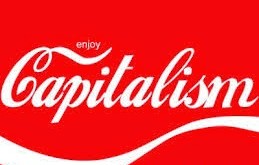This follows quite clearly from (1) the logic of Marx’s own theory in volume 1 of Capital and (2) the empirical history of capitalism.Let us run through the steps: (1) Let us assume that the concept of abstract socially necessary labour time is valid (even though the concept is incoherent, cannot be properly defined and is empirically irrelevant). But, as I note, let’s assume – for the sake of argument – that it is coherent and empirically relevant.(2) For Marx, the total working day is...
Read More »Would Capitalism necessarily be destroyed if Human Labour fell towards Zero?
In a word: no.Why? Because an economy with more and more automation based on private enterprise and private capitalist production could still sell its output and obtain money profits, if a government managed the demand-side of the economy by providing a guaranteed income (with, say, taxes on consumption, property, and ownership of financial and real assets and returns from those assets, with the shortfall covered by central bank money creation). As long as the balance of payments functioned...
Read More »More on Engels’ Supplement to Volume 3 of Capital
It was in the spring of 1895 that Engels wrote his supplement to volume 3 of Capital (Howard and King 1989: 48), a small essay which clarifies how Engels understood Marx’s law of value at the end of Engels’ life (Engels died on August 5, 1895).This was written in May 1895 for the Neue Zeit (Marx 1991: 1027, n.), which is available as the “Supplement and Addendum” to Volume 3 of Capital in Marx (1991: 1027–1047).This supplement was partly inspired by the critical reviews of volume 3 of Capital...
Read More »The Failed End of Capitalism Prediction by Marx
This is made at the end of volume 1 of Capital in the “Historical Tendency of Capitalist Accumulation” chapter: “ As soon as this process of [sc. capitalist] transformation has sufficiently decomposed the old society from, top to bottom, as soon as the labourers are turned into proletarians, their means of labour into capital, as soon as the capitalist mode of production stands on its own feet, then the further socialisation of labour and further transformation of the land and other means of...
Read More »Comparative Advantage and Capitalism
[embedded content] From CAPITALISM the documentary by Ilan Ziv. In this short clip a discussion of comparative advantage and its limitations, with Pascal Lamy, Robert Boyer and yours truly (many others in this chapter, including Geoff Hodgson and Ha-Joon Chang).The Mexican secretary of finance that appears in the video is actually NOT talking about the Ricardian model of trade, which at least given its assumptions is logically correct, but about the neoclassical or Heckscher-Ohlin-Samuelson...
Read More »Marx on Mass Immigration and Capitalism
Just for all you Marxists out there.Here are Marx’s comments on mass immigration into Britain in the 19th century in a letter to Sigfrid Meyer and August Vogt in 1870: “But the English bourgeoisie has also much more important interests in the present economy of Ireland. Owing to the constantly increasing concentration of leaseholds, Ireland constantly sends her own surplus to the English labour market, and thus forces down wages and lowers the material and moral position of the English...
Read More »Bowles on Capitalism and Institutions
As I noted before I've been teaching a Political Economy course, which I assumed right before classes began, and, I decided to keep the textbook, since it was already ordered. The book is written by Bowles, Edwards, and in the last edition, Roosevelt and is titled Understanding Capitalism. I discussed before the meaning of capitalism here (see also this on the use of the term capitalism as a proxy for free market policies).Here just a brief comment on the use of the idea of modes of...
Read More »Capitalism: six part documentary by Ilan Ziv
[embedded content] Ilan Ziv's documentary. I appear in chapter 3 on Ricardo. But other than that, there is an impressive list of names, including Robert Boyer, Ha-Joon Chang, Noam Chomsky, David Harvey, James Galbraith, David Graeber, David Harvey, Kari Polanyi Levitt, Eric Mielants, Thomas Piketty, Robert Skidelsky and Yanis Varoufakis among others. It should be good for courses on history of ideas, history and about the crisis.
Read More »Material well being and morality
Wall Street Journal's logic. They say: "In the Americas 'thousands of persons are led to travel north in search of a better life for themselves and for their loved ones, in search of greater opportunities,' the pope said. 'Is this not what we want for our own children? We must not be taken aback by their numbers, but rather view them as persons, seeing their faces and listening to their stories, trying to respond as best we can to their situation. To respond in a way which is always humane,...
Read More »Where in the ABCT are Stock Market Bubbles supposed to be the Mechanism by which Capitalist Economies are destabilised?
It is a crucial point: Austrians complain about asset bubbles, but their Austrian business cycle theory (ABCT) or economic theory in general does not focus on stock market speculation or asset bubbles as a fundamental and inherent means by which an economy is destabilised.For example, in the ABCT it is real and unsustainable higher-order capital investment that is supposed to wreck the economy, not debt-financed asset speculation.The Austrians today are falsely claiming that they have some...
Read More » Heterodox
Heterodox

